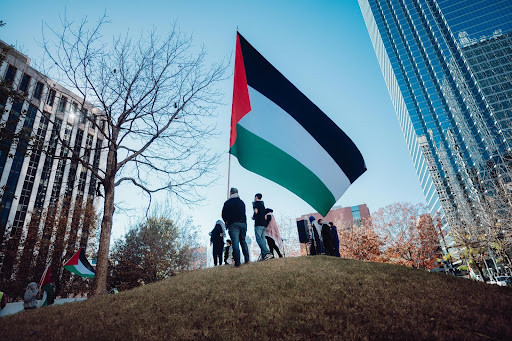Fintech Solutions Offer Hope For Gaza Reconstruction

Amid the devastation and ongoing challenges in Gaza, Dr. Adnan Mjalli, a Palestinian entrepreneur and philanthropist, is championing innovative solutions to revolutionize aid delivery and reconstruction efforts.
With a career spanning over two decades and more than 20 companies founded across sectors such as education, energy, and finance, Dr. Mjalli brings a unique blend of expertise and dedication to addressing the region's pressing humanitarian crisis.
His vision for leveraging fintech technologies like blockchain and digital wallets offers a transformative approach to rebuilding Gaza with transparency, accountability, and economic stability at its core.

Dr. Mjalli is also deeply committed to the Palestinian cause, serving on organizations such as the American Task Force on Palestine, the High Point University Board, The Foundation Board of GTCC, the High Point Chamber of Commerce, the Arab American University and AMIDEAST.
His philanthropic efforts are evident in his leadership of the Mjalli Foundation for Education and the American Academy of Palestine, both dedicated to supporting Palestinian youth through scholarships and educational development.
The Challenges of Aid Delivery in Gaza
The ongoing conflict in Gaza has presented a complex challenge for aid delivery, marked by a complete lack of trust between all sides, concerns about corruption, and limited transparency.
The current system tragically struggles to ensure the efficient and accountable distribution of assistance, leading to the ongoing humanitarian crisis. However, Mjalli believes that creative fintech solutions offer a ray of hope, providing a potential pathway to overcome these hurdles and establish a foundation for rebuilding Gaza after the war.
The Challenges of Aid Delivery in Gaza
Dr. Mjalli and his organization, the World Palestinian Economic Congress (WPEC), are emerging as natural partners in this endeavour due to their experience, vision, and unwavering dedication to the region.
Indeed, Mjalli, who is already using track and trace systems to bring in goods such as diapers and baby milk safely, is in the process of implementing a potentially game-changing fintech solution to make sure that the financial Aid can safely and securely get to the people of Gaza who so desperately need it, and not the terrorist organizations.
Dr. Mjalli outlined how fintech solutions can mitigate these challenges above and foster a more efficient and trustworthy aid ecosystem. Digital wallets, for example, can "significantly improve transparency and accountability in aid disbursement," he explained, adding that "by enabling real-time tracking of expenditures, these wallets can provide stakeholders with a clearer picture of project finances."
The Role of Blockchain and Stablecoins
Mjalli explained that he believes the new fintech platform will be "able to handle up to 50 million USD in the first three months in the initial stages, with the ability to scale up to 100-500M USD per month by the second quarter. By year two, he wants to bring billions of dollars through the system."
With similar fintech solutions in Ukraine right now, integrating blockchain technology can further enhance transparency and build trust by creating an immutable record of all transactions. This technology can effectively track the flow of funds, provide undeniable proof of project outcomes, and minimize the risk of corruption.
Additionally, stablecoins pegged to strong currencies can shield the local economy from volatility, attract foreign investment, and facilitate international trade. Mjalli believes this can contribute to a more stable economic environment, fostering effective and transparent reconstruction and development.
A Comprehensive Approach to Rebuilding Gaza
Under Dr. Mjalli's leadership, the World Palestinian Economic Congress (WPEC) is uniquely positioned to advocate for adopting fintech solutions with an extensive network in the West Bank and Gaza. His deep commitment to the Palestinian people is evidenced by his significant personal investments in initiatives that promote peace, stability, and economic resilience in the region. Dr. Mjalli envisions a future where blockchain technology and stablecoins form the bedrock of a transparent and stable financial ecosystem in Gaza and the West Bank.
Mjalli told us, "We need to make sure the butcher and the baker can get access to credit and sell their produce to legitimate customers." Importantly, he added, "Aid, including financial injections, must go to the right addresses to start rebuilding the economy. In the digital age, this is doable. This is very doable. And we have no time to lose."
A Path Toward Stability and Prosperity
WPEC's collaborative approach brings together the private sector, international organizations, investors, and funding agencies to work on impactful projects. The organization prioritizes projects that address critical needs in Gaza, encompassing areas such as water and sanitation, agriculture, housing, energy, healthcare, trade, education, transport, and finance.
Dr. Mjalli and his WPEC organization propose a two-stage approach to rebuilding Gaza, leveraging the power of fintech solutions. The first stage focuses on implementing digital wallets to enhance financial transparency and accountability in the urgent matter of humanitarian aid disbursement.
The second stage envisions integrating blockchain technology to strengthen transparency further, track the flow of funds, and provide irrefutable evidence of large-scale rebuilding project outcomes.
By embracing these innovative fintech solutions, Mjalli notes, "the international community can address the Gaza aid conundrum and lay the groundwork for a more prosperous and sustainable future for the region.
By tackling the root causes of distrust and promoting transparency, these technologies can empower the Palestinian people and cultivate an environment where peace and economic growth can flourish."
© Copyright 2023 IBTimes AE. All rights reserved.





















